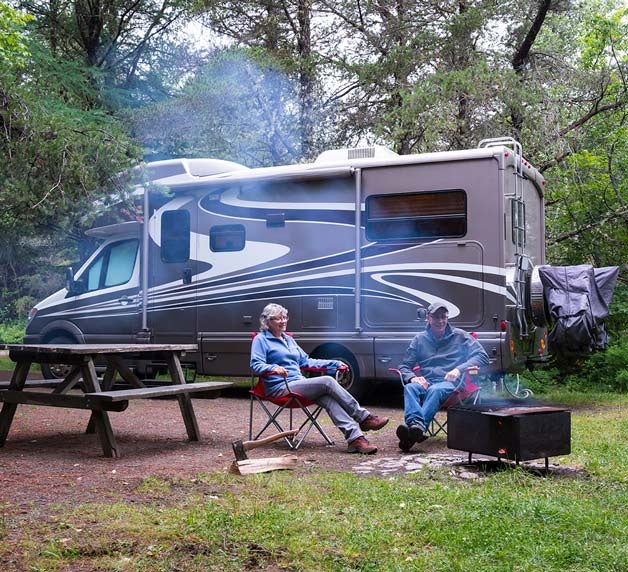If you’re a new or soon-to-be retiree with an itch to try RV life, you’re not alone. The RV Industry Association (RVIA) reports that nearly half—49%—of RV owners are 55 or older. Taking to the road in an RV is a great way to restart and explore not just the country but a new phase of life.
“RVing has always been very popular with retired people because of the freedom to travel the country and visit friends and family. They usually have more time to take long ‘bucket list‘ trips to see places they may not have had the time to visit in the past,” says Monika Geraci, spokesperson for the RVIA.
With more time and so many options to explore, how do you pin down the best ideas for RV road trips—and how do you make sure you’ve got a place to park your RV when you get there? Seasoned RVers share their best tips, so you select, reach, and enjoy your RV road trip destination when you get there.
Where to Go? Follow Your Muse
Stay close to home for your first few RV road trips, advises Gigi Stetler, CEO, and founder of RV Advisor and the owner of a Florida RV dealership. “I would consider staying within 300 to 400 miles at the most for your first few adventures. KOA and many other nationwide campgrounds would be a fabulous starting point,” she says.
Once you’ve got a little experience with the camping lifestyle and are comfortable driving or towing your RV, zero in on your personal interests, “ask yourself, ‘What do you like to do, and where are you going to go where you can do that?'” says retiree Mona Prater, who spends most of the year in an RV with her husband, Danny. They’re rockhounds, so they love spending time in New Mexico.
“This is the time to visit those places you’ve really wanted to see. You can go anywhere, and what you see from your trailer is absolutely incredible,” says Donna Brown, who RVs with her husband, Gary.
Avoid East Coast congestion by heading to the Midwest or West, advises Amy Collins, who’s on the road full time with her husband, Tim Clark. “On the East Coast, everything’s so narrow and crammed together. The Midwest and West parks are designed for RVs with big parking lots and wide-open spaces,” she says.
Travel Off Season to Save Money and Avoid Crowds
Be thoughtful about when you travel, though. The crowds during peak seasons can make visiting during these times less enjoyable. Booking a campground during school breaks and other high travel times is also more difficult, as many popular sites fill up months or even a year in advance.
“With the surge in popularity of RVing, it is not always that easy to find a campsite in some of the most popular RV parks. But retired people can travel during the week and at off-peak times when demand for the most popular destinations will be lower,” says Geraci.
That’s why RVer Michael Scarpignato, who blogs at RV Blogger with his partner Susan McDonald, camps during “shoulder seasons”—those periods just before or after peak season.
He also takes weather into account, heading north toward cooler weather in the summer. That’s a strategy that Mark Petersen and his wife also embrace. “We prefer cool or cold weather, so if we want to visit North Carolina’s Outer Banks, we go in December, January, or February when there isn’t that heat and humidity,” says Petersen, founder of Arvie, a new booking site that acts as a Travelocity for camping sites. The beach is still beautiful, he adds, and there’s more camping availability.
It works the same with the Blue Ridge Parkway or the Great Smoky Mountains, he says. “There’s nothing like being in that area in October, but it’s hard to find a campground then. If you go two to three weeks after peak season, it’s less crowded, less expensive, and still beautiful,” Petersen adds.
Plan Where You’ll Go, What You’ll Do, and What You’ll Spend
When planning your RV road trip, be sure to factor in your budget and how far you’re comfortable driving.
Campsite fees vary, so your budget will influence where you can stay. Brown, who says that state parks can be more affordable than other options, was “blown away” by fees at some coastal sites. “If you know you’re going to be in the area for a while to explore, ask about weekly or monthly rates because they’ll be less expensive than daily fees,” she advises.
When deciding where to go, Prater advises searching online for appealing activities at your destination options in advance. “That will help you find an area you can stay in for a week or month without getting bored,” she says.
Use what you learned in your early “test” trips close to home to plan driving times you can tolerate. Petersen uses the 330 rule popular with RVers: Don’t travel more the 330 miles a day or after 3:30 p.m. Setting up camp mid-afternoon gives you time to settle in and still enjoy the evening, he says.
Scarpignato says his RV road trips with McDonald are more enjoyable when they plan them out. “We take time to research where we want to go, what we want to see, and why we want to go there to help determine all the stops along our route,” he says.
Depending on where you’re going and when you might need to reserve a campsite in advance. Some avoid that and save money by boondocking (camping off the grid) without the basics such as electricity, bathroom dumping stations, and restrooms that typically come with a campground. While Prater and her husband have done their share of boondocking, she does caution that it’s not for everybody, especially retirees who might have health issues.
She points out that there’s often no cell service in beautiful but remote locations. “We’re both older, and if one of us had a heart attack, we couldn’t call an ambulance,” she says.
For those willing to pay for a few amenities, there’s an online reservation site or app for just about any type of campsite you want, whether it’s a state park, KOA, or RV resort. In addition, the booking site Arvie aggregates all of your reservation options into one interface, making it easier to find and book a spot, especially when your first choice is sold out.
Leverage the Wisdom of the Crowd
Collins relies heavily on Facebook groups for RV road trip information and advice. Her favorites include:
Prater appreciates that RV Life has many older members, while Scarpignato and McDonald’s group, RV Camping for Newbies, with more than 68,000 members, is popular with novices.
Facebook group members and bloggers can provide insights on where to camp and what to do while you’re there. For example, blogger Scarpignato suggests taking your RV on the ferry to Martha’s Vineyard south of Cape Cod after Labor Day, when the weather is still lovely, but vacationers have returned to their daily lives. “You can stay at Martha’s Vineyard Family Campground and enjoy an amazing week on a historic island. There is even a shuttle bus that stops at the campground, so you have access to the whole island,” he says.
RV road warriors also rely heavily on apps to find specialized or unique camping locations. For typical campgrounds, Collins and Prater like Campendium, which Prater says is particularly easy to use. Collins also uses Harvest Hosts to find camping sites at wineries, breweries, and farms, while Prater uses iOverlander to find boondocking locations, and Scarpignato favors HipCamp for campsites on private land.
And don’t forget GasBuddy, says Prater. “I get nine miles to the gallon, so if I can save pennies on gas, I do it,” she adds.
Help Is Always Close By
Don’t let concerns about the inevitable equipment problems or breakdowns keep you from hitting the road. Help is often just a website away—the Praters like Bob Well’s CheapRVliving YouTube repair videos. And if that doesn’t work, there’s likely to be another RV right behind you.
“You’re never alone. If you’re having a problem, somebody will come up behind you and say, ‘I can help.’ There’s an ongoing RV community you don’t see all the time, but it exists,” says Collins.
Seniority is published by Finance of America Reverse LLC. The views expressed in this publication are those of the author alone and do not necessarily reflect the views and opinions of Finance of America Companies. This article is intended for general informational and educational purposes only and should not be construed as financial or tax advice. For more information about whether a reverse mortgage may be right for you, you should consult an independent financial advisor. For tax advice, please consult a tax professional.




